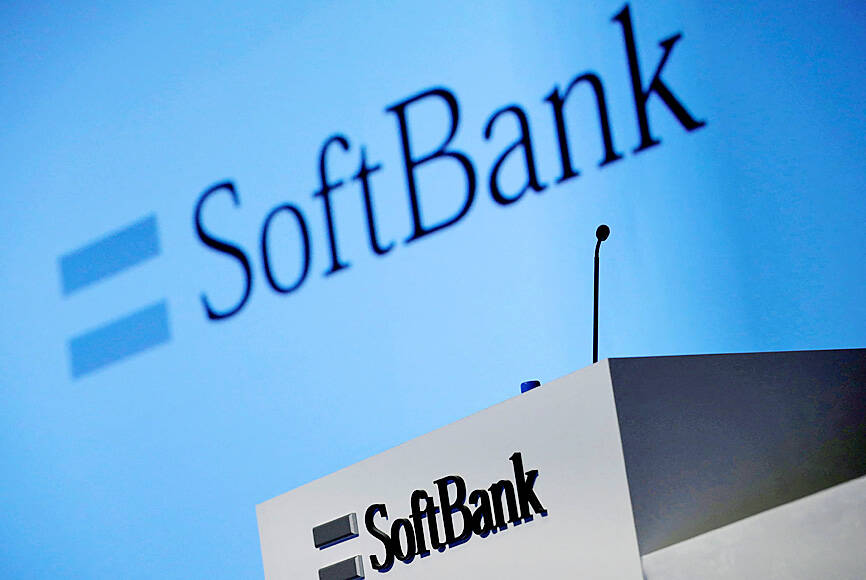Softbank Group Corp yesterday reported an annual net loss of US$7.2 billion after a bruising year for the tech start-up sector in which it is heavily invested.
The company said its annual net loss came to ¥970 billion (US$7.2 billion) on sales of ¥6.57 trillion, reflecting in part major losses from its Vision Fund portfolios.
The Vision Fund 1 and 2 vehicles were hit by the global tech rout, the company said in a statement.

Photo: Reuters
“Share prices of numerous public portfolio companies declined for the fiscal year amid the weakness in global stock markets, although share prices of several companies rose in the fourth quarter,” it said.
“The fair value of a wide range of private portfolio companies also decreased, reflecting markdowns of weaker-performing companies and share price declines among market comparable companies,” it added.
The two funds recorded ¥4.3 trillion in losses, Softbank said, as they took hits across a range of start-up investments, from long-struggling WeWork Inc to delivery service DoorDash Inc.
“Softbank Group’s performance very much depends on share prices,” Toyo Securities Co analyst Hideki Yasuda said ahead of the company’s announcement.
Analysts fear that more bad news might be on the cards.
RISK OF MARKDOWNS
“We believe that the private company portfolios ... are at risk of further meaningful markdowns going forward,” wrote Victor Galliano, an analyst who publishes on SmartKarma.
Vision Fund vehicles had reported losses for four straight quarters through December last year.
Meanwhile, the company’s mobile unit has declared it is joining a global race to build a version of ChatGPT, following a plethora of US and Chinese corporations and start-ups vying to roll out their own conversational bots.
Wireless unit Softbank Corp set up a new entity in March, choosing about 1,000 people to develop a Japanese-language version of ChatGPT, chief executive officer Junichi Miyakawa said during an earnings briefing on Wednesday.
He did not elaborate on the project’s goals or progress so far.
Softbank Group billionaire founder Masayoshi Son, who for years touted AI as a revolutionary force in the way we use technology, gathered a group of engineers recently and spoke about ChatGPT’s possibilities, Miyakawa said.
He did not give details.
“We are dead positive on ChatGPT,” Miyakawa said. “Most of our meetings these days touch on topics related to ChatGPT. The ChatGPT party has started.”
Additional reporting by Bloomberg

CHIP RACE: Three years of overbroad export controls drove foreign competitors to pursue their own AI chips, and ‘cost US taxpayers billions of dollars,’ Nvidia said China has figured out the US strategy for allowing it to buy Nvidia Corp’s H200s and is rejecting the artificial intelligence (AI) chip in favor of domestically developed semiconductors, White House AI adviser David Sacks said, citing news reports. US President Donald Trump on Monday said that he would allow shipments of Nvidia’s H200 chips to China, part of an administration effort backed by Sacks to challenge Chinese tech champions such as Huawei Technologies Co (華為) by bringing US competition to their home market. On Friday, Sacks signaled that he was uncertain about whether that approach would work. “They’re rejecting our chips,” Sacks

Taiwan’s long-term economic competitiveness will hinge not only on national champions like Taiwan Semiconductor Manufacturing Co. (TSMC, 台積電) but also on the widespread adoption of artificial intelligence (AI) and other emerging technologies, a US-based scholar has said. At a lecture in Taipei on Tuesday, Jeffrey Ding, assistant professor of political science at the George Washington University and author of "Technology and the Rise of Great Powers," argued that historical experience shows that general-purpose technologies (GPTs) — such as electricity, computers and now AI — shape long-term economic advantages through their diffusion across the broader economy. "What really matters is not who pioneers

BUBBLE? Only a handful of companies are seeing rapid revenue growth and higher valuations, and it is not enough to call the AI trend a transformation, an analyst said Artificial intelligence (AI) is entering a more challenging phase next year as companies move beyond experimentation and begin demanding clear financial returns from a technology that has delivered big gains to only a small group of early adopters, PricewaterhouseCoopers (PwC) Taiwan said yesterday. Most organizations have been able to justify AI investments through cost recovery or modest efficiency gains, but few have achieved meaningful revenue growth or long-term competitive advantage, the consultancy said in its 2026 AI Business Predictions report. This growing performance gap is forcing executives to reconsider how AI is deployed across their organizations, it said. “Many companies

TAIWAN VALUE CHAIN: Foxtron is to fully own Luxgen following the transaction and it plans to launch a new electric model, the Foxtron Bria, in Taiwan next year Yulon Motor Co (裕隆汽車) yesterday said that its board of directors approved the disposal of its electric vehicle (EV) unit, Luxgen Motor Co (納智捷汽車), to Foxtron Vehicle Technologies Co (鴻華先進) for NT$787.6 million (US$24.98 million). Foxtron, a half-half joint venture between Yulon affiliate Hua-Chuang Automobile Information Technical Center Co (華創車電) and Hon Hai Precision Industry Co (鴻海精密), expects to wrap up the deal in the first quarter of next year. Foxtron would fully own Luxgen following the transaction, including five car distributing companies, outlets and all employees. The deal is subject to the approval of the Fair Trade Commission, Foxtron said. “Foxtron will be